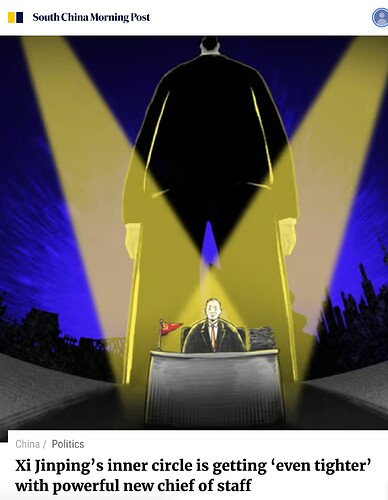-
共产党总书记习近平的新办公室主任可能会使该办公室更加强大,反映了习近平对此类职位重要性的看法。
-
中共中央办公厅主任蔡奇是毛泽东时代以来领导该办公室的最高级别官员。
-
该办公室负责安排国家最高领导人的文书工作、会议和个人安全,上个月习近平去莫斯科时被称为 “办公室主任”。
-
习近平称赞该办公室是高级领导层的 “智囊团”,而蔡奇被任命为党的第五级官员和意识形态负责人,表明习近平计划继续巩固自己在党内的权力。
-
蔡奇与习近平的关系可以追溯到20世纪90年代初,他可能会把台湾和国家安全方面的专业知识带到这个办公室。
-
在2017年一场致命的火灾之后,蔡奇以高压手段将农民工赶出北京,这表明他的办公室的地位是习近平加强党的控制的努力的一部分。
-
办公室主任的办公室一直是一个重要的党内机关,在中国政治中拥有巨大的权力,并与权力非常接近,但这些属性在习近平领导下得到了加强。
-
习近平坚信,党必须是至高无上的,不能有被边缘化的风险,并认为维护党的作用和他的个人地位是相互关联的。
-
2012年上台后,习近平任命栗战书为办公室主任,使他成为30多年来第一位担任政治局委员的办公室主任,大大提升了办公室在党内的地位。
-
习近平还清洗了该办公室的前主任令计划,他曾是其前任胡锦涛的办公室主任。
-
留在办公厅的前令副主任被调任到不太重要的岗位。
-
据一位北京的政治学家称,办公室的权力核心在于它对提交给党的最高领导人的信息的控制。
-
从国家领导人的房间里放什么东西到最高领导人的安全,办公室都要负责。
-
在2018年对中央政府机构和党的最高机关进行了重大改革后,办公室承担了一些以前属于政府机构的工作。
-
该办公室的作用类似于美国总统办公厅主任办公室对最高领导人周围信息的控制,但据信中国办公室的职能范围更广。
-
它负责代表政治局及其常务委员会发布党的文件,这些文件对全国的党组织具有约束力。
-
欧亚集团的托马斯表示,中国共产党权力的进一步集中增加了总书记办公室主任所拥有的影响力。
-
习近平从一开始就对办公厅和高级官员办公室主任的工作表现出兴趣,强调他们作为政策顾问的重要作用。
-
他希望办公厅能提供重要的政策建议,为领导人的决策过程提供便利。
-
丁薛祥从2017年到今年3月担任习近平的办公室主任,现在是中国排名第一的副总理和排名第六的党政官员。
-
他说,办公室主任最重要的工作是提供政策建议,并与他们的最高官员的想法产生共鸣。
-
习近平还说,一般办公室的助手必须保守秘密,不泄露信息,以免损害党的领导。
-
在接近1990年的采访结束时,习近平呼吁更多来自综合办公室的官员得到晋升,这是他在2012年成为总书记后所遵循的做法。
-
在现任政治局常委的六位同事中,有四位曾在省级党委或政府的综合办公室工作。
-
选择蔡奇担任办公厅主任并提升职务,可能与越来越多的高层党委的需要有关,也可能表明习近平对年轻一代缺乏完全信任。
-
Communist Party General Secretary Xi Jinping’s new chief of staff is likely to make the office even more powerful, reflecting Xi’s views on the importance of such positions.
-
Cai Qi, director of the General Office of the Communist Party Central Committee, is the highest-ranked official to head the office since the time of Mao Zedong.
-
The office arranges the paperwork, meetings, and personal security of the country’s top leaders and was referred to as “chief of staff” when Xi went to Moscow last month.
-
Xi has hailed the office as the “brains trust” of the senior leadership, and Cai’s appointment as the party’s fifth-ranked official and its ideology chief suggests Xi plans to continue cementing his own power over the party.
-
Cai’s ties to Xi date back to the early 1990s and he may bring Taiwan and national security expertise to the office.
-
Cai’s heavy-handed eviction of migrant workers from Beijing after a deadly fire in 2017 suggests his office’s status is part of Xi’s efforts to strengthen the party’s control.
-
The chief of staff’s office has always been a key party organ that wields enormous power and has great proximity to power in Chinese politics, but those attributes have been strengthened under Xi.
-
Xi is convinced that the party must be supreme and cannot risk being marginalised, and believes that safeguarding the party’s role and his personal status is interlinked.
-
After assuming power in 2012, Xi Jinping appointed Li Zhanshu as his Chief of Staff, making him the first Director of the Office in more than 30 years to be a member of the Politburo, significantly elevating the Office’s status in the Party.
-
Xi Jinping also purged the Office’s former Director, Ling Jihua, who was Chief of Staff to his predecessor Hu Jintao.
-
Former Ling deputies who remained in the Office were reassigned to less important jobs.
-
According to a Beijing-based political scientist, the core of the Office’s power lies in its control of the information presented to the Party’s top leadership.
-
The Office is responsible for everything from what items are put in a state leader’s room to the security of the top leaders.
-
After a major overhaul of central government bodies and top Party organs in 2018, the Office took on some work that previously belonged to government bodies.
-
The Office’s role is similar to that of the US Presidential Chief of Staff Office in its control of information around the top leader, but the Chinese Office is believed to have a wider range of functions.
-
It is responsible for issuing Party documents on behalf of the Politburo and its Standing Committee, which have binding force for Party organisations nationwide.
-
Thomas from Eurasia Group stated that the further concentration of power in the Chinese Communist Party had added to the clout wielded by the general secretary’s chief of staff.
-
Xi Jinping showed an interest in the work of general offices and the chiefs of staff of senior officials since the beginning of his career, stressing their significant role as policy advisers.
-
He wanted the general offices to provide key policy suggestions and facilitate the decision-making process for leaders.
-
Ding Xuexiang was Xi’s chief of staff from 2017 to March of this year, and is now China’s first-ranked vice-premier and sixth-ranked party official.
-
He said that the most important job of a chief of staff is to offer policy suggestions and to resonate with their top official’s thoughts.
-
Xi also said that aides in general offices must keep secrets and not leak information to avoid damaging the party’s leadership.
-
Close to the end of the 1990 interview, Xi called for more officials from general offices to be promoted, something he followed after becoming general secretary in 2012.
-
Four of his six colleagues on the current Politburo Standing Committee have worked in the general offices of a provincial party committee or government.
-
The choice of Cai as chief of staff and the elevation of the office could be to do with the needs of a growing number of top-level party committees, and it could also suggest that Xi lacks complete trust in the younger generation.
